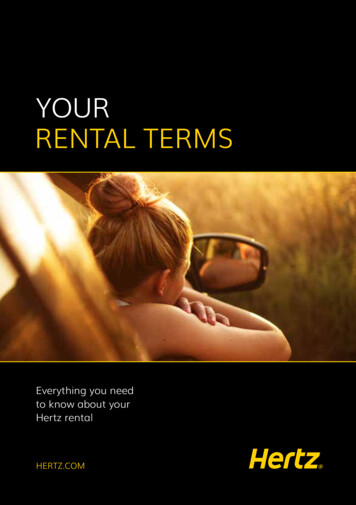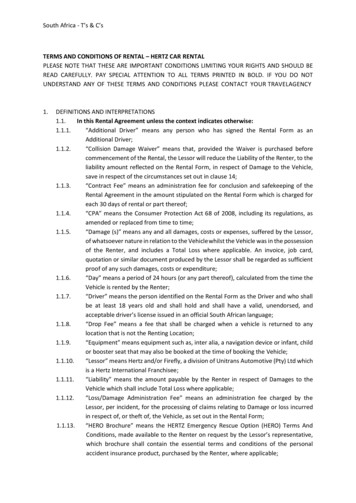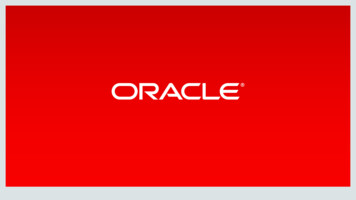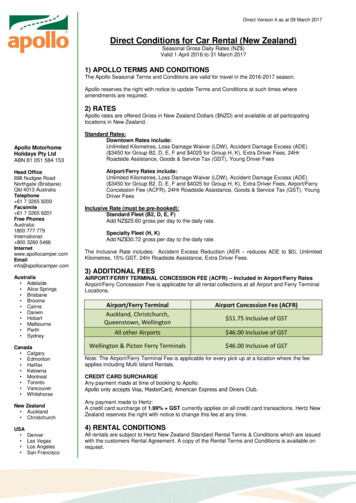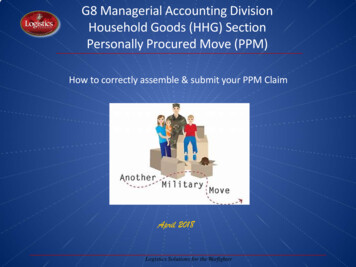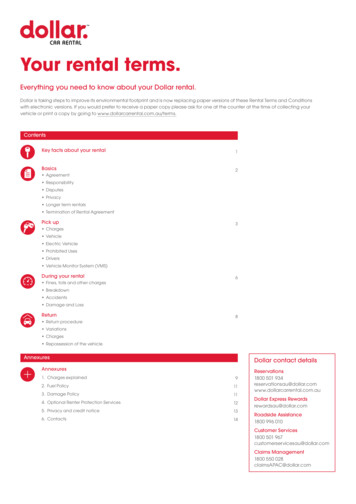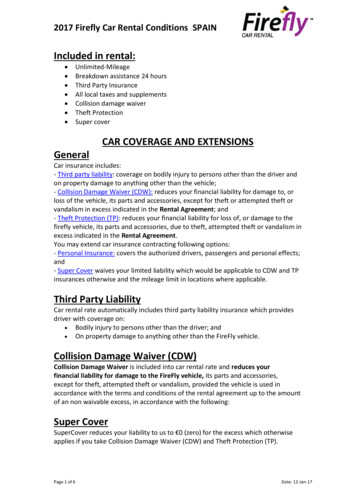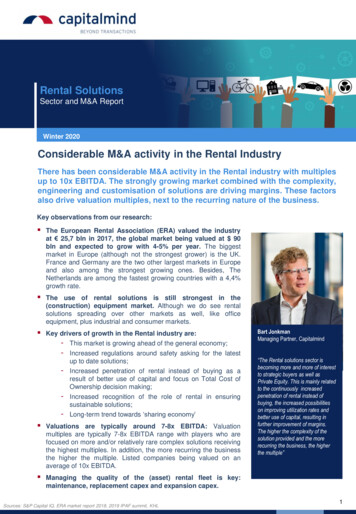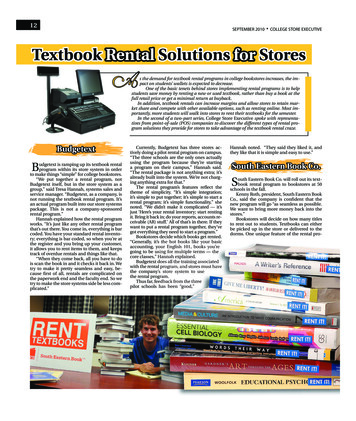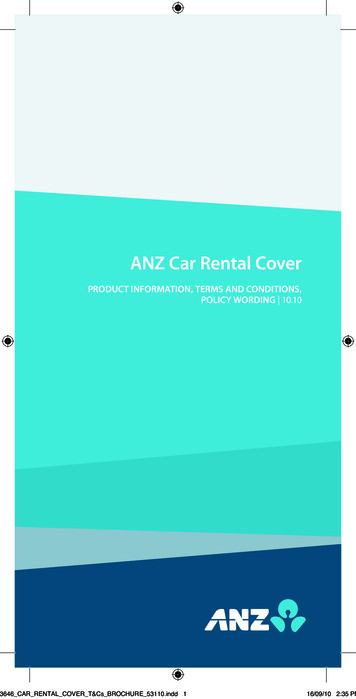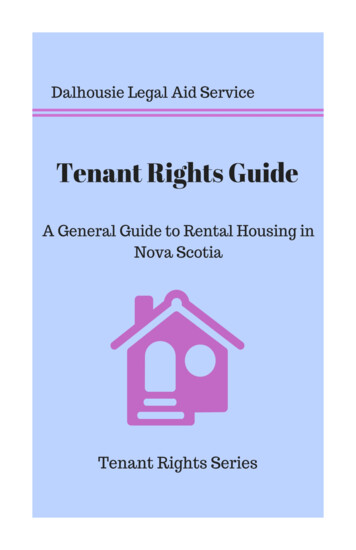
Transcription
A General Guide to RentalHousing in Nova ScotiaMay 2018
DOES THIS BOOKLET APPLY TO YOU?This booklet is a guide for tenant’s rights in Nova Scotia. In NovaScotia, the Residential Tenancies Act and Regulations (the RTA) arethe law for rental housing. This means that your rights as a tenantare covered by the RTA.Are You Covered by the RTA?If you pay rent you are probably covered by the RTA, even if youdidn’t sign a lease. However, there are some exceptions.In other words, the RTA DOES apply if you live in: Apartment, Flat or Rooming House House or Housing Co-operative (Co-op) Public / Metro Housing Manufactured home spacesThe RTA does NOT apply if you live in: University Residences Shelters Hospitals or Nursing Homes / Care Facilities Correctional Facilities Hotels / MotelsTHIS GUIDE CONTAINS LEGAL INFORMATION, NOT LEGAL ADVICEAND IS NOT INTENDED TO REPLACE TALKING TO A LEGALPROFESSSIONALEverything depends on the individual circumstance. You should onlyrely on this as a guide. If you need further help, see the Resourcespage at the back of this guide. This guide is current as of: June 11,2019.I
CONTENTSFinding a Place to Rent1Before You Sign1Rental Application Fees1Sample / Model Units1Receiving a Copy of the Lease1Utilities2Co-signers2Payments in Cash3Being a Good Tenant4Documentation4Responsibilities4Tenant Insurance5How to Pay Your Rent6Leases7Types of Leases7What Should be in a Lease9Changing a Lease from Yearly to Monthly11Rental Increases13Rental Increase for Fixed-term Leases13By How Much Can a Landlord Raise Rent13Taking Away a Service14Security Deposit15II
The Landlord Keeping the Security Deposit15Normal Wear and Tear16Cleaning16Maintenance and Repairs18Pests19Landlord’s Right of Entry21Roommates23Disputes Between Roommates23Subletting and Re-assigning25Differences25Liability for a Sublet26Responsibilities27Ending Your LeaseLandlord Ending a Lease2930Ending Your Lease Early32Health Reasons32Domestic Violence33Breaking a Lease Without Proper Notice34Unpaid Rent34Security Deposit34Eviction36Eviction for Unpaid Rent36Eviction for Other Reasons38Form E & F–How to Respond41III
Enforcing an Eviction OrderAbandoned Property4243Landlord’s Obligations43Exceptions44Best Practices44Pets45Smoking46Cannabis46Medical Cannabis47Co-operative Housing (Co-ops)48Public Housing49Manufactured Home Parks51Lot Rent51Renting a Condo52Legal Procedures and Dispute Resolution53Dispute with Landlord53Dispute with Roommate53Terms / Glossary54Resources56IV
FINDING A PLACE TO RENTBefore You Sign:Read the lease and the rules. Never sign anything that you have notread.Make sure you go through the rental unit and very carefully documenteverything that is damaged. Your landlord should offer to inspect theunit with you on the day you move in, so you should document everything during this inspection.Rental Application Fees:Rental application fees are illegal. A landlord cannot ask you for a rentalapplication fee when you are looking for a place to rent.Sample / Model Units:Never sign a lease for a rental unit that you have not seen. Ask the landlord if the unit they are showing you is the actual unit you will be moving into, or if it is a “sample / model unit.” If it is a model unit, ask whenyou will be able to view the unit you will actually be moving into. Alsoask why the actual unit is not available for viewing. The landlord has theright to enter an available unit to show it to prospective tenants, sothere should be no reason for them to refuse to show you the placethey want to rent to you.Receiving a Copy of the Lease and the RTA:Your landlord MUST give you (or one of your co-tenants if you are sharing a place) a copy of the lease within 10 days of the day you sign thelease.1
Your landlord MUST also give you a copy of the RTA. If there is morethan one tenant, the landlord only has to give a copy of the RTA to oneof the tenants. The landlord can give you a paper or electronic copy.The electronic copy may be a web link to the RTA. The landlord CANNOT charge you money for the copy of the RTA.If your landlord does not give you a copy of your lease or of the RTA,you can end your tenancy. You can terminate the lease either at anytime before you receive a copy of the lease or RTA, or with one fullmonths’ notice after you have received a copy of the lease and actfrom the landlord.Utilities:When you are looking for a place to rent make sure to always ask whatutilities are included. Make sure that the lease clearly says which utilities are included and which ones are not. For example, if heat and hotwater are supposed to be included in the rent, make sure it says so inthe lease.NOTE: Always ask how the unit is heated. This is because alease might say that heat is included in the lease, but electricityis not. In this case if the unit is heated by electric heaters youwill pay for the electricity that the heaters use to heat yourplace and will end up having to pay for your heat, even thoughit says heat is included in the lease.Co-Signers:A co-signer is someone who signs the lease with the tenant, but is nota tenant. They are also called a guarantor. The co-signer does not live inthe rental unit. The co-signer is held legally and financially liable forthe rental unit. This means that if the tenant cannot or does not pay2
rent, or damages, the co-signer will have to pay for them. The landlordcan go after the co-signer, the tenant, or both for unpaid rent.Getting a co-signer:A landlord is allowed to ask for someone to co-sign your lease if theyhave reason to believe that you cannot afford the rent on your own. Alandlord can refuse to rent to you if you do not have a co-signer, andyou can’t afford the rent on your own. In these cases to be able to rentthe unit you will need someone to be a co-signer.Being a co-signer:Be very cautious before you co-sign for somebody. For example, if youco-signed for a friend and they do not pay their rent, by law you willhave to pay their rent. Even if the landlord is able to easily claim againstthe tenant, they could choose to go after you instead if they believethere is a greater chance of recovering from you than the tenant. As aco-signer, you are on the hook for the entire period of the lease. If youwant to get out of the agreement, you have to get permission of thelandlord, and the landlord will have to sign a new lease with the tenant.A co-signer cannot get out of the agreement on their own.Payments in Cash:It is important to document as much as you can when finding a place torent. This means that you should not make any payments in cash, because even if you get a receipt it is very hard to prove that you made thecash payments. You should NOT pay for your rent or security deposit incash. You should avoid paying anything related to your tenancy in cashso that you can have a way of documenting your payments.For more information please see our specializedFinding a Place & Being a Good Tenant Guide.3
BEING A GOOD TENANTDocumentation:Document everything! Documentation is crucial to being a good tenant.If you have proper documentation for how you pay your rent, for requests for repairs, etc., you will be better prepared to defend yourself ifneed be.Good things to document: Keep receipts of your rental payments. When first renting the unit take pictures of the whole unit(including appliances, windows, doors, closets and so on) and sendthese pictures to yourself so that they are dated. If something needs to be repaired take pictures of it. Document all important conversations with your landlord. Do thiseither by corresponding by email, or by writing out any in person orover the phone conversations with your landlord and emailing themto your landlord so that they are dated, and so that you can refer tothem if necessary.Responsibilities: You are responsible for notifying the landlord of any problems withthe property. This includes whether repairs are needed, or if thereare bed bugs, for example. In short you are responsible for takingreasonable care of the property and notifying your landlord of anyproblems with the property. You are responsible for not bothering your neighbours. Living in anapartment is different than in a house, which means that you needto be more cautious of how much noise you make; if you smoke,where you’re smoking; and so on.4
You are responsible for following the landlord’s written rules. If youagreed to any landlord-made rules in the lease (like no smoking, orno pets), you have to follow these rules. You are responsible for the “ordinary cleanliness” of your rentalunit. Lack of cleanliness does not refer to day-to-day housekeeping,but to excessive clutter or filth. You are responsible for giving your landlord proper notice for ending your tenancy.Please see our chapter on Ending Your Lease for moreinformation on this.Tenant Insurance:Tenant insurance covers damage from fire, flood and liability. Liability inthis case means that if someone gets injured at your place and they sueyou for damages you will not have to pay the damages, your tenant insurance will. Tenant insurance also covers some types of extensivedamage to the property that would not be covered by the security deposit.Many landlords are including tenant insurance as a landlord’s rule making the tenant responsible for it. However, even if your lease specifiesthat you are responsible for tenant insurance, that doesn’t mean thatyou have to purchase it. It means that if you purchase it you will have topay for it, your landlord will not cover it.Your landlord cannot evict you for not having tenant insurance, butthey could charge you for the costs of damages to the unit that wouldhave been covered by tenant insurance.NOTE: If you can afford tenant insurance, Dalhousie Legal AidService highly recommends you get it.5
How to Pay Your Rent — Best Practices:Do not pay your rent in cash. Even if you get a receipt, it is never agood idea to pay rent in cash.Safe Ways to Pay Your Rent: ChequeNote: Your landlord CAN legally request post-dated cheques aslong as this is stated in the written lease. Some banks allowthem to be deposited early, which can be a problem. E-mail money transfer Direct deposit Money order If you receive Income Assistance (IA), you can either ask your IAworker to either: Pay your rent directly to your landlord , or Get a Trustee who will pay your rent directly to your land-lordYou MUST pay your rent in full and on time. If you do not pay your renton time, your landlord can charge you a late payment penalty. However, if your landlord wants the right to charge you a late payment penalty, they must include this information in the lease that you signed. Alate payment penalty for late rent can be no more than 1% of the totalrent you pay per month. For example, if your rent is 500, a penalty canbe no more than 5 a month.NOTE: You cannot pay your rent in trust to ResidentialTenancies. Even if you have a problem with your landlord, youmust pay your rent to them while you are living in your rentalunit.6
LEASESA lease is a legally binding contract. You should always read a leasebefore signing it. If you sign a lease, you will be held responsible for everything that you agree to in the lease (as long as it doesn’t contradictthe Standard Form of Lease or the RTA). If you or the landlord violateanything in the lease, you or your landlord can ask for a Residential Tenancies Hearing. If there is something in the lease that is not the same onboth your copy and the landlord’s copy, it is not valid.Types of Leases:There are two types of leases: Written: A written lease is a written agreement and it cannot bemodified orally. It can only be modified in writing The most common form of written lease is the Standard Form of Lease. Verbal: A verbal lease is a verbal agreement. Legally, a verbal leasegives you the same rights and responsibilities as if you had signed awritten, month-to-month, Standard Form of Lease.Terms of Lease:The term of a lease refers to how often a lease is renewed. There arethree main terms of leases in Nova Scotia: Monthly (renewed month to month) Yearly (renewed year to year) Fixed-term LeaseIn monthly and yearly leases, the lease will automatically renew itselfeach month or year (depending on the type of lease) unless you giveyour landlord proper notice that you will not renew the lease.7
Fixed term leases do not have a notice period. The tenancy period endson the date stated in the lease. There is no right or obligation to stay inthe rental unit after the fixed term lease ends.NOTE: Even though verbal leases are legally valid, anyagreement you make with your landlord should be either inwriting or documented in some way.Standard Form Lease:A landlord cannot just make up what must be in a lease. The RTA setsout the “Standard Form of Lease.” It is a form that sets out standardized details for a lease. Landlords in Nova Scotia are supposed to givetenants a “Standard Form of Lease.” You can get a copy at an AccessNova Scotia Centre or online at: d-lease.pdfNOTE: If the landlord puts anything in a lease that isinconsistent with the “Standard Form of Lease” or the RTA, it isnot valid. Even if you sign it or agree to it, the landlord cannotenforce the invalid term and you do not have to follow it.A landlord is allowed to put in their own rules, as long as they are reasonable and do not contradict the RTA. You will be held responsible forthose rules if you sign the lease.8
What Should be in a Lease:Contact information for your landlord: By law your lease MUST state the landlord’s name, physical address, and telephone number OR the name, physical address and telephone number for someone responsible for the property.Occupants: The landlord has the right to know who will be living with you inyour rental unit. This includes people who will not be responsible forthe rent, such as your children. Anyone who will be living with you andis not going to be financially responsible for the rent should be listed asan ‘occupant’ on your lease.What’s Included: Your rent may include things like appliances, utilities, or a parkingspot. If something is included in your rent then the landlord is responsible for it. If it is not included, then you are responsible for it. For example, if your lease says heat is included, but parking is not included, thismeans that your landlord is responsible for providing heat, but not fora parking spot.Security Deposit: The term security deposit means the same thing as damage depos-it. The lease should state how much money you gave to your landlordas a security deposit. It should also have the date and the name of thebank the landlord put the security deposit in.9
Inspection: Your landlord should do an inspection of the unit with you just before you move in. The inspection report should be attached to thelease. If no inspection was done it should say so on the lease. See theFinding a Place & Being a Good Tenant Guide for more information.Reasonable Rules: A landlord is allowed to put their own rules in a lease, as long asthey are reasonable, relate to the well-being of the building and residents, and are not against the law. Rules have to apply to everyone inthe same building. For example, if one person is not allowed to havepets, then no one in the building can be allowed to have pets.A rule is reasonable if: It ensures that services are fairly distributed to all tenants. It promotes safety, comfort, and the wellbeing of all tenants. It protects the landlord’s property from abuse.Examples of reasonable rules are: No smoking; no pets; don’t put nails in the wallExamples of unreasonable rules are: You must have a pitched roof on your manufactured home; youcan’t cook after 10 pm; no Christmas trees before December 15.All rules must be in writing and the landlord must give you a copy ofthe rules with the lease. You will be held responsible for those rules ifyou sign the lease.10
NOTE: Rules about smoking and pets are common rules madeby landlords. For more information on these please go to thesections on Pets or Smoking. If the rule is not in the Standard Form of Lease it is not legally required. It is a landlord made rule, and you may ask them to changeit. If you do not agree with a rule, ask to have it changed prior to signing the lease. If the landlord agrees to an amendment of a rule on alease it is important to obtain their consent in writing. That way ifthere is ever a dispute or disagreement about a rule being brokentheir consent is documented.Changing a Lease from Year-to-year to Month-to-month:In Nova Scotia yearly leases do NOT automatically become monthlyleases after a year. If you want to change a yearly lease to a monthlylease, you must give your landlord a 3-month written Notice to Quit foryour yearly lease, along with a written request to change to a month-tomonth lease.You must give your Notice to Quit at least three months before the endof the yearly lease. The lease becomes a monthly lease as of the anniversary date. The anniversary date is the day your lease started and remains the same every year. For example, if you signed your lease onJune 1st, your anniversary date is June 1st. This means that even if yougave your notice in January, the lease will not become monthly in April.It will only become monthly on the anniversary date: June 1st, in thiscase.Your landlord must respond in writing within 30 days if they wish torefuse. The landlord cannot arbitrarily or unreasonably refuse to giveyou permission to change to a monthly lease. If you do not receive aresponse, your landlord is deemed to have consented to your requestfor a month-to month-lease.11
NOTE: If you don’t give the full 3 months notice your landlordcan refuse to change the lease from yearly to monthly, and itwill remain a yearly lease.NOTE: The law is about to change such that tenants no longerhave to request the change, they must only give notice. Checkwith Dalhousie Legal Aid Service if you are trying to changeyour lease from yearly to monthly to see if any updates havebeen made.12
RENTAL INCREASESA landlord can only raise the rent once every 12 months. Your landlord CANNOT raise your rent for the first 12 months after you startyour lease. This applies to all types of leases – monthly, yearly andfixed-term.Your landlord MUST give you proper written notice that your rent willincrease. This must be done within the proper notice period dictated bythe type of lease you have.Proper Notice Requirements: For a yearly or monthly lease: 4 months before your anniversarydate, and it can only be increased once a year at most. For a fixed-term lease: Whatever it says in your lease.Rental Increases for Fixed Term Leases:If you sign a fixed term lease, the rules for rental increases are differentthan for other types of leases. The original lease that you sign must include the details about when your rent will increase and by how much.For example, if you sign a 2-year fixed term lease, it could set out thatyou will pay 800 per month for the first 12 months and then your rentwill increase to 850 per month for the second 12 months. Your landlorddoes not have to give you notice of the rental increase because you already have the information in the lease.By How Much Can A Landlord Increase the Rent?:There are no restrictions on how much a landlord can raise the rent inNova Scotia. As long as the landlord only raises the rent once every 12months they can raise it as much as they want. They must give you fourmonths notice before raising the rent.13
Taking Away a Service is the Same as Increasing the Rent:Some rental agreements include services such as heat, electricity, aparking space or use of a common room. If your landlord decides tostop providing a service but does not lower your rent, it is considered the same as a rental increase under the law. Even if you paidextra for the service, a change in the service may be treated as arent increase.If your landlord wants to stop providing a service (whether or not itwas listed in your lease), they must follow the rules for increasingrent noted above.NOTE: The landlord has to choose betweenwithdrawing a service OR increasing the rent. Thelandlord CANNOT do both in the same year.If the landlord either raises the rent or withdraws a service more thanonce a year, or doesn’t give you proper notice, you CANNOT just refuseto pay the extra rent. You MUST file a complaint to Residential Tenancies using Form J and ask for your rent to be lowered or for your serviceto be restored. If you do not file a complaint, your landlord could giveyou an eviction notice for late rent.For more information please see our specialized LegalProcedures & Dispute Resolution Guide.14
SECURITY DEPOSITThe landlord CAN ask you to pay a security deposit (sometimes called a‘damage deposit’) at the beginning of your tenancy.In Nova Scotia your landlord cannot demand more than one half of thefirst month’s rent as a security deposit. For example, if your rent is 600, the security deposit can be no more than 300.A security deposit is not the last month’s rent. Your landlord cannotdemand the last month’s rent at the beginning of your tenancy — thisis illegal.Your landlord cannot ask for extra deposits for things like keys, fireextinguishers, carpets, or pets. However, they can apply to keep yoursecurity deposit if you do not return your keys at the end of the tenancy.Your landlord cannot ask for or charge an application fee — this is illegal.The only money the landlord can ask for is the rent and the security deposit. Anything else is illegal.The Landlord Keeping the Security Deposit:Your landlord can only keep the deposit for damages or unpaid rent. Ifyour landlord wishes to keep your security deposit, and you do not consent, your landlord is supposed to apply to Residential Tenancies within 10 business days after the end of your tenancy. If they do not applywithin 10 days after the end of your tenancy the security deposit is supposed to be returned. However, there is no penalty if they do not applywithin 10 days. Some landlords keep security deposits without filing aclaim to keep it.If your landlord does not return your deposit and you do not agree, youmust file with Residential Tenancies, using “Form J: Application to the15
Director,” to have your deposit returned. You then need to go to ahearing where the Residential Tenancies Officer decides who gets tokeep the security deposit.Normal Wear and Tear:Security Deposits cannot be kept for ‘normal wear and tear.’ Wearand tear is the normal amount of use or deterioration in a rental unitover time. A good way to think about it, is that no matter how well taken care of, a 10 year old carpet does not look like a new carpet.Cleaning:The landlord is entitled to have the unit returned to them only to astate of ordinary cleanliness. The landlord is not entitled to keep orapply a tenant’s security deposit to hire professional cleaning servicesin order to have the unit returned to them in a state of pristine cleanliness.However, if the tenant has returned the unit to the landlord in a statebelow what would be considered ordinary cleanliness, and the landlordrequires professional services to restore the apartment to ordinarycleanliness, then the landlord might be entitled to the damage deposit(or a part of it). For example, the landlord may be entitled to apply thesecurity deposit to carpet cleaning fees if the lease dictates that thetenant was required to clean the carpets at the end of the tenancy.16
Common Cleaning Issues:Some common disputes over cleanliness can lead to landlords trying tokeep your security deposit, or a part of it, to cover cleaning costs. Themost common cleaning disputes that Dalhousie Legal Aid sees are tocover cleaning costs for certain appliances that are hard to clean or thatare ignored during cleaning.These include: The inside of the oven The inside of the fridge Behind appliances The bathtub and shower The carpetMake sure to clean these areas to prevent your landlord from holdingon to your security deposit.17
MAINTENANCE & REPAIRSYour landlord must keep your unit in a decent state of repair. They mustalso comply with all applicable health, safety, and housing laws in addition to the RTA.The unit must be set up for heat, electricity, and water. If a lease statesthat a service such as heat is included in the rent, the landlord must continue to provide heat and cannot charge extra for it. If the landlordwants to change the lease so that heat is no longer included in the rent,it will be considered a rental increase. If the landlord does this they willbe required to give 4-months notice before the anniversary date of yourlease. If you are in a fixed-term lease, any rental increases must be indicated in the lease.NOTE: Even if you’re responsible for paying for the heat in yourunit, the landlord is still responsible for the maintenance andrepair of the furnace, heaters and etc.If your landlord is refusing to make necessary repairs you can file a complaint with Residential Tenancies: To either have a hearing to receive an Order for your landlord to dorepairs or continue a service. Or, to request a rental abatement, which is when your landlord paysyou for the inconvenience and costs of the repairs.However, you cannot withhold rent because your landlord is not performing a repair.18
Building Inspector:If you are living in the Halifax Regional Municipality (HRM), you can callHRM customer service at 311. The inspector will give your landlord anorder to do the repairs, and if your landlord does not do them withinthirty days, HRM will do the repairs and charge your landlord. This isgenerally faster than going through Residential Tenancies. That beingsaid, HRM cannot order rental abatements, a continuation of a servicenot related to building repairs, or payment of rent in trust. For theseservices you must go to Residential Tenancies.Pests:The landlord is responsible for keeping the apartment free from pests.But, your landlord is not liable if there are occasional pests. You can only end your lease if there is a major pest problem.If your landlord tries to get rid of the pests but can’t, you can still endthe lease (as long as the pests are a major problem). It doesn’t matterhow much your landlord tries to get rid of the pests. What matters is ifthey do get rid of them.Bed Bugs:Bed bugs are slightly different from other pests. Unlike rats or ants, bedbugs travel with people, so you can be held responsible if you broughtthe bed bugs with you to the apartment. For example, if you boughtused furniture, or took it off the street and this furniture had bed bugs.The landlord is responsible for treating the unit for bed bugs. The tenant (you) is responsible for damage caused by bed bugs if you broughtthe bed bugs into the unit. If you did not bring the bed bugs in then youcannot be charged for damages caused by the bed bugs.19
Heat:There are standards for heating throughout Nova Scotia that are different from one municipality to another. For example, in the HRM a landlord has an obligation to turn on the heat whenever the room temperature falls below 20 degrees.NOTE: As always it is important to document everything. Thiswill help you if your case goes to a hearing or to Small ClaimsCourt. Take pictures, save receipts, documents detailing therepairs, or correspondence asking your landlord to do therepairs.20
LANDLORD’S RIGHT OFENTRYThe landlord CANNOT enter your unit without proper notice, unlessthey have your permission or there is an emergency.A landlord can legally enter the tenant’s unit for:An emergency: It is hard to define what constitutes an emergency. However, a riskof significant damage to the building itself or someone’s life beingin danger will be considered emergencies. The landlord CAN comeinto your rental unit without notice to deal with the emergency. Anexample of an emergency, which would allow your landlord tocome into your unit without notice is, if a pipe has burst and there isa risk of flooding the building. It does not matter if you are home ornot.With 24 hours written notice: The landlord CAN come into your rental unit with 24 hours writtennotice. They can also send someone in to fix things, like the superintendent, or a hired repairman. In either case they MUST give you 24hours written notice. They can only come in to do the repairs duringnormal daylight hours 9am to 9pm. The landlord CANNOT force youto let them in to make repairs in the middle of the night.21
To show the unit to a new tenant: If you are going to end your tenancy and move out of your unit, thelandlord can bring the prospective new tenants into your unit toshow them around. This would only be after you have served thelandlord a Notice to Quit, or if the landlord has served you with anotice to quit and you haven’t challenged it. If you have challengedit then the landlord can’t show the unit to prospective tenants untilthe dispute is resolved. The landlord can only bring people intoyour unit during normal daylight hours 9am to 9pm. The landlorddoes not need to provide you with any notice if they are showingthe unit to rent it to a new tenant. It does not matter if you arehome or not.NOTE: You can ask for your landlord to give you notice forwhen they are going to show your apartment to prospectivetenants, but your landlord does not have to give you notice.22
ROOMMATESBe careful when choosing a roommate. When you sign a lease, you arecommitting to a legally binding contract. If you sign a lease with someone you don’t know very well, or someone you know is irresponsible,you are taking a risk that could cost you huge amounts of money.If more than one tenant signs a lease, the law says that they are “jointlyand severally liable.” This is a legal term that means roommates are allresponsible for the lease, but at the same time any one roommatecould be sin
Tenant insurance also covers some types of extensive damage to the property that would not be covered by the security de-posit. Many landlords are including tenant insurance as a landlord's rule mak-ing the tenant responsible for it. However, even if your lease specifies that you are responsible for tenant insurance, that doesn't mean that
